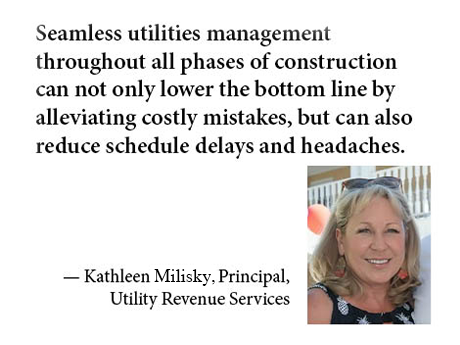— By Kathleen Milisky of Utility Revenue Services (URS) —
Every developer knows all too well the headaches that can arise from utilities while building or managing a community. Time lost to issues such as power outages, delayed inspections and miscommunication can add unnecessary costs to any project.
Smart utilities management is an effective way to stay ahead of problems before they start.
Owners have the option of turning responsibility for the utilities over to an expert before they even pull a construction trailer onto the development site. It can be helpful to have a designated “point person” who pays attention solely to the temporary utilities (and then the permanent ones). This designated point person can handle all logistics to make sure utilities are deployed properly from the start and that any unforeseen issues get resolved promptly. This leaves nothing to fall through the cracks or confusion as to who is responsible.
Utilities management encompasses all utilities that serve a particular property, including energy (electric or gas), water and internet. Seamless utilities management throughout all phases of construction can not only lower the bottom line by alleviating costly mistakes, but can also reduce schedule delays and headaches. Smart management can save a developer a substantial amount of money and allow property staff to focus on their core competencies.
Streamlined utility management begins in the pre-construction phase and continues well after the project has been completed and transitioned to operations. Developers can streamline utilities management by:
- Arranging for temporary electric and internet to be set up before the arrival of construction crews.
- Understanding deposit requirements and deposit options.
- Ensuring a correct property address to meet USPS approval.
- Setting up clear processes for reading and payments on temporary utilities to avoid unnecessary fees.
- Understanding long-term implications regarding submetering contracts.
During the construction phase, utilities management requires owners to:
- Set up all electric, gas, water and telecom accounts with proper relevant details, such as correct contact and billing information.
- Make sure all parties are clear on who is paying for what and what percentage as projects move from construction to operations.
- Reach out to the local permitting jurisdiction to confirm utility inspections have been scheduled.
- Research the best pricing for gas and/or electricity during the construction phase.
- Liaise between construction project manager and utility providers to keep everything on schedule.
Navigating the transition from construction to operations can be tricky particularly when done in various stages, or by individual units — as can often be the case with multifamily dwellings. Best practices for a smooth transition include:
- Coordinating turn schedules with the construction project manager.
- Keeping track of the units turned and the addresses updated with utility companies.
- Canceling all temporary accounts as directed.
- Communicating regularly with operations staff to ensure awareness of the stage of the project and expectations.
Once the project is nearing completion, the utilities expert will tie up all the loose ends. This point person can help facilitate a smooth and painless transition by working with the operations team to ensure they understand their accounts and management expectations, as well as assist in the billing that begins with new resident move-ins.
Kathleen Milisky is a principal at URS, which provides utility management services to real estate owners, developers and management companies. URS’ services include utility auditing, developer assistance, sustainability services, expert guidance in gas and electric procurement and dry utility consulting.


